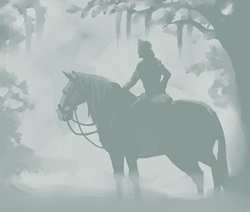
Retreat is not normally a word associated with victory, but the story of Apple Cider and Peter Horry's Patrol is the classic exception. British Major Robert McLeroth and his troops were moving back toward Kingstree from Nelson's Ferry when Francis Marion caught wind of McLeroth's position. It was rumored that Colonel Samuel Tynes, leader of the Loyalist militia (supporters of the British) had come out of hiding and was going to be fighting alongside McLeroth's troops, making the British even stronger. Francis Marion was eager to fight this enemy before they grew in size and strength and became even more formidable. Marion rounded up his troops and set out to find the British and their Loyalist allies.
Marion stopped off in Indian Town briefly to devise a strategy and put in place "the proper precautions against surprise" (Rankin 128). Marion ordered Colonel Peter Horry to send a patrol through the High Hills of Santee to reconnoiter Colonel Tynes' new Loyalist militia post located at Fort Upton and engage this enemy if practical. Horry's patrol rode through the night along a road east of Black River. Horry's men then made a stop at a tavern whose owner was known for having sympathy toward the British and Loyalists. Horry's patrol treated this tavern keeper "with the rough attention they felt on account of his political persuasions" (Rankin 128). The patrol finished lunch and Horry began to question the tavernkeeper. Meanwhile, the clever tavernkeeper's wife led one of Horry's men to a shed behind the tavern. She silently pointed to a barrel of apple brandy, of which the soldier immediately began to imbibe. This soldier then called over some of the other soldiers of the patrol. They all enjoyed several rounds in addition to filling their canteens to the brim for later enjoyment.
As the men set off again, Horry began to notice that his men were oddly giddy and constantly sipping from their canteens. He asked them what they were drinking, to which they replied, "Water, sir, water! Nothing but water!" (qtd. in Rankin 129). Horry knew this was a boldfaced lie, as he said later that "....some grinned in my face like monkeys; other s looked as stupid as asses; while the others chattered like magpies" (qtd. in Rankin 129). All of the troops were extremely drunk, except for Captain Nelson and Colonel Horry, of course.
Their guide was a portly fellow who ambled back and forth in such a grand manner that he finally lost his footing and came crashing onto the ground, "a limp and sodden mass of drunken blubber" (qtd. in Rankin 129). The troops could not move forward - their cries created such a ruckus that it would have been impossible to sneak up on a dead man and they were all too clumsy and drunk to fight in a battle. Horry ordered a retreat.
Horry said that the movement was "executed with all the noise and irregularity that might be expected from a troop of drunkards, each of whom mistaking himself for commander-in-chief, gave orders according to his own mad humour; and whopped and hallooed at such a rate, that I verily believe no bull drivers ever made half the racket" (qtd. in Rankin 129). To have led men in such condition into action would have resulted in their slaughter. "I therefore instantly ordered a retreat," said Horry (qtd. in Bass 106).
It may seem as though the attack on Fort Upton failed when the troops turned into a drunken circus. However, that was not the case. Horry's drunken troops created such a clamor with their inebriated revelries that the Black River Loyalists, in a state of alarm, spread word that Marion's troops were in the area. "Horry's comic foray was, however, as effective as a battle. His whooping, drunken troopers, raging like bull drivers in a hassle, terrified the Loyalists along the Black River" (qtd. in Bass 107). By the time this story reached Upton Hill, it became so exaggerated that it was said General Harrington's command was marching to Fort Upton to attack. Only twenty of Tynes' militia stayed with him; the rest left immediately upon hearing this story. This impressive loss of troops frightened Tynes into leaving Fort Upton and begging for permission to resign as a militia leader. His resignation was accepted.
The battle, if it had occurred, would not have had such a favorable outcome for Horry's Patrol, even if they had been sober. Casualties would have resulted. Instead, Horry's troops had to worry only about their colossal hangovers. The lives of Loyalist troops would also have been lost also. The actual results of this drunken misadventure were far more beneficial than anyone could have imagined. Lives of both Patriots and Loyalists were spared, injuries avoided, and the Loyalists were suppressed. Ironically, a large amount of apple cider and a drunken retreat resulted in one of the oddest victories of the Revolutionary War.
Works Cited
Bass, Robert D. Swamp Fox: The Life and Campaigns of General Francis Marion. 1959. Columbia: Sandlapper Press, 1972.
Rankin, Hugh
F. Francis Marion: The Swamp Fox. Leaders of the American Revolution
Series. New York: Thomas Y. Crowell, 1973.

